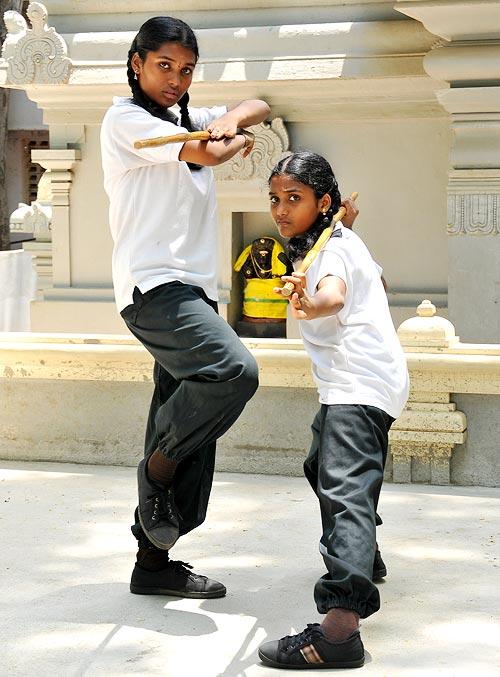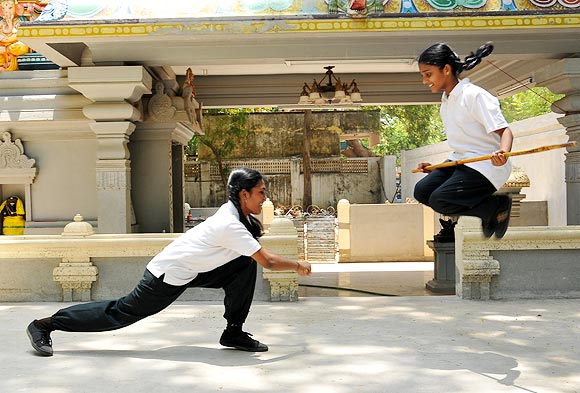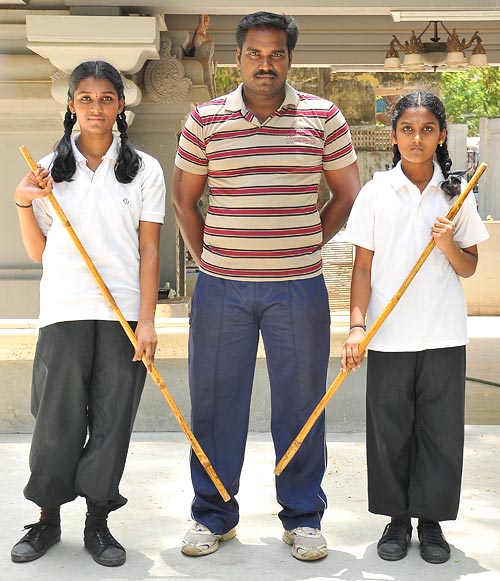
S Saraswathi met up with international Silambam champions N Nagabhavani and N Lakshmi Soujanya and their coach in Korattur, Chennai. Here's what she learned about the two young experts and the dying sport.
A small demonstration at her school's annual sports day became the turning point in N Nagabhavani's life. The Silambattam (a weapon-based Dravidian martial art from Tamil Nadu, also known as Silambam) demonstration was a great hit with the children of Bhaktavatsalam Vidyashram, and Nagabhavani stunned the crowd with her intricate movements and techniques.
"She is a natural," says head coach Mr Ramachandran. "We started training a couple of weeks before the event. From Day One, Nagabhavani showed a natural aptitude for this art and the school encouraged her. Today she is the winner of many national and international championships," he adds proudly.
A Class XI student, 16-year-old N Nagabhavani has been training for the last four years. Her younger sister N Lakshmi Soujanya also followed in her sister's footsteps and has been training for three years now. Together, in this short span of time, the two sisters have participated and won many national and international events.
At her very first international competition held in Nagercoil, Tamil Nadu, in 2010, Nagabhavani won two silver medals and one bronze. Later, at the International Silambam Tournament held in Malaysia last December, she won four golds and two silvers, while her sister Lakshmi won three golds and one silver. They also gave an amazing performance at the Seventh Nationals held in Pune, Maharashtra, with Nagabhavani winning six gold medals and one silver and Lakshmi Soujanya winning five golds and one silver.

Mr Ramachandran explains that the participants are judged on six parameters in the competition: the single stick rotation, double stick rotation, bare hand forms (kuthu varisai), sword rotation (vaal veechu), the team event (kulupotti) and of course, stick fighting (kambu sandai). The participants are awarded points for their speed, accuracy and technique.
Nagabhavani claims that she was always interested in various sporting activities, but did not seriously pursue anything in particular, until Silambam. "Silambam fascinated me from the beginning and I wanted to know more about this ancient martial art form from Tamil Nadu," she says.
"We are trying to promote Silambam in schools in Chennai as a sport and a form of self-defense," says coach Ramachandran, who is himself a winner of many national championships. "Initially it was difficult to get the parents to allow their children to train, as most of them prefer to enroll them in karate, dance or chess classes."
But the coach feels that youngsters should be encouraged to take more interest in such traditional art forms, as they have been part of our culture for thousands of years. Silambam was patronised by the ancient Chola, Chera and Pandya kings of South India.

"Since these art forms are not very popular, we are unable to get sponsors for the children," he complains. "An 11-member team from the school was selected to represent India at the Seventh International Championships, but due to lack of sponsors, all of us were forced to travel at our own expense and this was a huge burden for the families of the students," he says.
The girls' mother, N Mookambika, agrees. "I am a single parent and I had to spend Rs 1.2 lakh for my children to participate in this event. It was very difficult, as I am the only earning member of the family."
India placed second in the championship, which was attended by students from Singapore, Malaysia, Sri Lanka, Japan and Iraq. But even now, despite the formation of the Indian Silambam Federation, which is responsible for the encouragement, organisation, control and sponsorship of Silambam as a sport in India, not much assistance is forthcoming.
"We are trying to include Silambattam as part of the school curriculum, as this will encourage more children to take an interest in such traditional art forms," says physical director of Bhaktavatsalam Vidyashram, Mr David Benjamin Ruben. "We try to choose different kinds of sports, mostly fitness-oriented, to motivate the students to be more active. We are also coaching the children in Mallakhamb, the ancient Indian art of pole gymnastics. People today are not aware of such traditional games, so we try to present a small demonstration on Sports Day and other occasions. Once they've seen a live demonstration, they are more receptive to the idea. Even Silambattam was introduced in this way."
Nagabhavani wants to be a doctor when she grows up, but she is very passionate about Silambattam. "I want to become a doctor, but I love Silambam and will continue to practice it," she says. When asked about it interfering with their school work, both sisters say that practicing Silambam has actually helped them perform better academically. "Silambattam has helped improve our focus and concentration. It has also helped build our confidence and develop a positive attitude towards life," they maintain. In fact, Nagabhavani scored 90 per cent in her Class X exams.
"My wife has done her MSc in yoga and together we train the students. I have conducted Silambam training camps all over Tamil Nadu and we have many such plans to promote this highly organised game," says Mr Ramachandran. "This ancient Dravidian martial art, which was once widely practiced in villages for self-protection, is now gradually fading. It is important that we do something to revive and popularise it among the younger generation."
Photographs: S Saraswathi